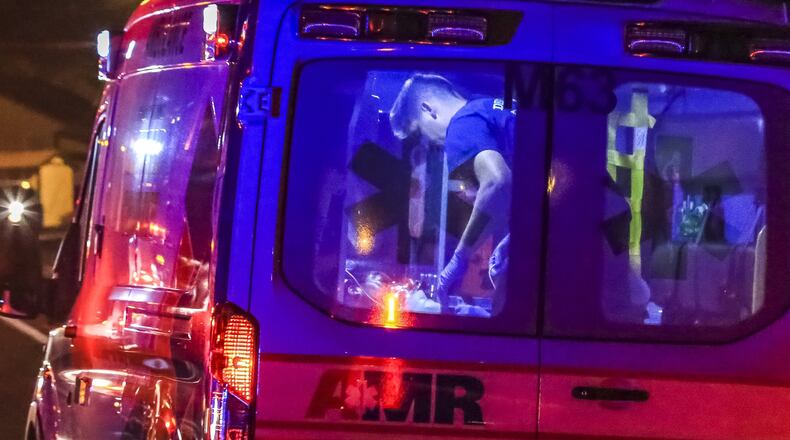Incident after incident has piled up, to the alarm of city officials:
After being struck by a car, a pedestrian waited almost an hour for a medical transport.
An ambulance never showed, so a peace officer had to transport a mentally ill patient to the hospital in his patrol car.
An EMT was arrested after accusations she had assaulted a handcuffed 17-year-old patient in the ambulance.
For years, these and other EMS failures have plagued Dunwoody, city officials say. The situation has gotten so dire, Mayor Denny Shortal said, that his council had to declare a state of medical emergency, signaling to the public a situation that has the potential to put lives at risk.
“I just want Mr. and Mrs. Citizen to get to the hospital on time,’’ Shortal said.
The situation has drawn attention to a broader issue: holding emergency medical transportation services accountable. Critics say Georgia has a flawed system in which regional councils oversee ambulance providers but can struggle to hold them to their commitments even when there are chronic public safety concerns.
"This has been a problem for quite some time," said Julianne Thompson, who is serving as the spokeswoman for The Georgia Ambulance Transparency Project, a new coalition that is advocating for changes in the state's system. "We have come together as a coalition to fight against the way the EMS selection has gone down in Georgia."
The Region 3 Council, which covers most of the Atlanta metro area, is now the case in point.
Dunwoody has lodged complaints with the council for several years about the ambulance company serving all of DeKalb County and now wants permission to operate its own ambulances. Last year, city officials say, average response times were nearly 15 minutes for 90 percent of calls.
“It started out as a bad situation in 2015, then it went to horrible in 2016 and then worse than horrible in 2017 and the early part of 2018,” Councilman Terry Nall said.
The complaints finally prompted the Region 3 Council last month to establish a task force to study concerns in all of DeKalb County’s 13 cities and unincorporated areas.
In a meeting Thursday, the task force said it found the service is riddled with problems. Before recommending what to do, though, the task force said it wanted to see if the county can come up with a solution that works for everyone.
“It’s imperative that DeKalb includes every city’s input. It’s absolutely imperative,” said Ricky Burnette, Roswell’s fire chief.
The task force says it will wait until February before making its recommendation.
Weak contract
Under Georgia’s system for choosing and overseeing ambulance providers, the state Department of Public Health has final say. But the state relies on recommendations from 10 regional councils. The councils, in turn, may give say-so to some local governments.
That’s been the case in Region 3, where DeKalb County in 2013 decided to outsource ambulance service.
The Region 3 council endorsed the county’s decision to contract with just one company – American Medical Response — for the 271-square-mile area, fending off calls to divide the county into more ambulance zones. Cobb County, in contrast, has two zones, with different providers in each. There are five in Fulton County.
Since privatizing service, DeKalb has repeatedly acknowledged performance issues with AMR, and it has levied nearly $2 million in fines.
But in pressing for improvements, the county has been hobbled by what it and others now say is a weak contract.
That contract, for example, only calls for fines if response times exceed 13.59 minutes. If AMR exceeds that, the contract says it can be fined $100 per minute, up to a maximum of $1,000 on a call. The charge for not responding to calls is a $1,000 fine.
Erin Fuse Brown, a professor at Georgia State University’s College of Law who specializes in healthcare billing, financing and delivery, said the penalties allowed under AMR’s contract aren’t stiff enough to motivate the company to step up response times.
Brown, who examined the contract at the AJC’s request, said DeKalb could have taken other actions, though. Bottom line, she said: “If the county is free under the contract to terminate the agreement if a contractor is not performing what it is supposed to be doing under the contract, then the question is why hasn’t the county done that?”
Some members of the task force said Thursday there were other problems with the contract as well. Also cited were problems with a fragmented system for handling calls.
DeKalb CEO Michael Thurmond told the AJC that the contract had been “poorly constructed.”
One major flaw he sees is that that it didn’t distinguish between emergency and non-emergency ambulance calls and hold the contractor accountable for delayed response on life-threatening ones. That, Thurmond said, is unacceptable.
But DeKalb still wants to be in charge of ambulance service countywide. Thurmond said that with AMR’s contract expiring at year’s end, the county will consult with cities about what they would want in a new contract.
The county and cities will meet Oct. 18 to discuss the issue.
“Beginning in 2019 and beyond, we are going to have the contract, I think, that will address the needs of DeKalb County, unlike the one that is in place now,” said Thurmond, who was elected as CEO in 2016.
AMR blames poor response times on traffic conditions and to a significant increase in the time area hospitals take to receive patients and return ambulances to the system.
The average time for an ambulance patient to be placed in an emergency room bed has grown to one hour, and, in some cases, it can take up to three to four hours, an AMR official wrote in response to questions from the AJC.
The company contested some fines but in August agreed to settle by paying up to $596,000 in cash to the county and providing more than $1 million in improvements as in-kind payments, including additional ambulance shifts and more ambulance service hours.
EJ Dailey, the EMS director for Region 3, declined to comment, referring questions to the Department of Public Health.
DPH spokeswoman Nancy Nydam said that in making a final decision, its objective will be “economy, efficiency and benefit to the public welfare.” She wouldn’t discuss the concerns in DeKalb County. “Because of the ongoing review…it is not appropriate for DPH to comment further,” she said.
No standards
Others say ambulance problems result from weak state laws and the close ties regional councils have with the emergency medical industry.
Thompson, the coalition spokeswoman and a Republican strategist, said Georgia needs to set statewide standards for EMS response times for critical emergency medical calls, as well as for routine calls. Georgia doesn’t have a statewide standard, but national standards say an EMS unit should arrive within 9 minutes for 90 percent of calls.
The coalition also wants a ban on "pay to play" – ambulance company officials making campaign contributions to county officials, who appoint the majority of council members. Thompson said the coalition has drawn support from grassroots organizations in Athens, Georgia Ethics Watchdogs, Georgia Conservatives in Action and Common Cause.
Also of concern is the makeup of the regional councils. Members include fire chiefs, trauma physicians and other EMS professionals, as well as ambulance operators. That can compromise decisions, Pat Graham, chairwoman of the Barrow County Board of Commissioners, told the AJC.
“The current practice of allowing private ambulance providers to sit, as voting members, on these Regional EMS Councils and openly advocate for their own companies obtaining lucrative contracts to provide local EMS services, seems to run afoul of county and municipal ethics ordinances,” said Graham, who supports the goals of the new coalition.
Supporters of the current system acknowledge that it may take time for the councils to research complaints. Ultimately, though, action is taken to ensure public safety, said council member Pete Quinones, president and CEO of MetroAtlanta Ambulance, which serves parts of Cobb County.
For an example of the council’s responsiveness to public complaints, look no further than what happened in South Fulton, he said.
South Fulton pleaded for assistance, citing average response times of almost 25 minutes and cases of critically ill and injured patients waiting for an ambulance for 30 minutes to an hour.
The council this summer replaced AMR there after it saw evidence of failures, Quinones said.
Quinones also said that council bylaws require that he recuse himself from any vote that gives his company an unfair advantage over contracts. Other members are affected by the same rules. Physicians, for example, must abstain if a decision involves a hospital affiliate that operates an ambulance service.
“The system works,” he said.
DeKalb County is essentially a landlord to American Medical Response ambulance service. Under the county’s 2013 contract, AMR pays $620,00 a year to rent portions of DeKalb fire stations and $55,000 for administrative and oversight services. It also had to pay a one-time fee of $35,000 for communications set-up and programming.
The contract also set the number of ambulances the company was required to operate and fully staff, although the company subsequently agreed to some additions.
AMR does all the patient billing and collections.
The contract automatically renews each year, but it can be terminated for bankruptcy, failure to supply sufficient skilled workers or suitable equipment, disregard of laws or orders of public bodies, and other causes.
The contract is set to expire Dec. 31, but the DeKalb CEO has authority to extend it.
About the Author
Keep Reading
The Latest
Featured





